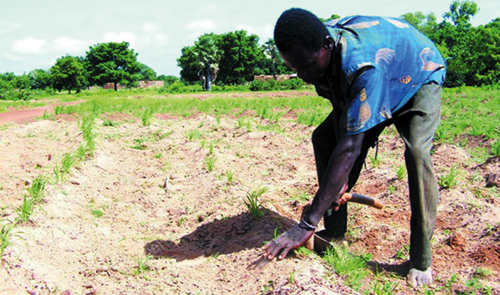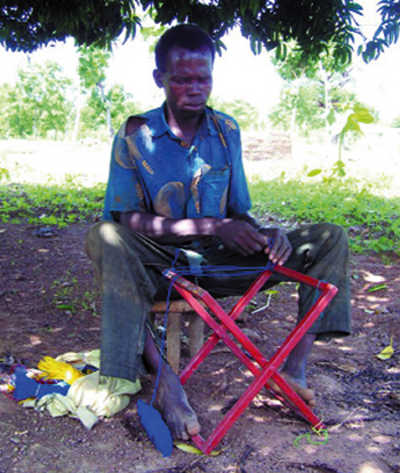Konsoa Kambiré – a blind man with a thousand occupations
Kounsoa Kambiré is blind since childhood ,but nevertheless capable of a thousand different jobs. He lives in Segré a village 5 km from Diébougou in the Bougouriba province and his achievements force our admiration. At age 35 with a family to provide for, he manages to grow on his own millet,maize, beans and groundnuts. Let us zoom in for a while on this man of many trades, with a tremendous fighting spirit in spite of his blindness. He is also a musician, plays the balafon, is a weaver and raises animals.
 Konsoa Kambiré at work in his millet field You must see him at work to believe! On Saturday at 8 in the morning on July 23rd he was out in the field at Ségré in the Bourgouriba province. He tills the soil with a rudimentary tool, the daba. All by himself he cultivates his millet. With dexterity he had already cleared the weeds from part of the land and left behind him neat rows shining with millet plants. When looking on from a distance everything seems to indicate that he is just an ordinary farmer. But on approaching one understands that here a blind man is at work. His mother, Werbar Kambiré, tells us that he was born in good health. But when he was four years old he came down with chicken pox and turned blind. In spite of all he says that he understood early that his blindness was not to be seen as a fatality.
Konsoa Kambiré at work in his millet field You must see him at work to believe! On Saturday at 8 in the morning on July 23rd he was out in the field at Ségré in the Bourgouriba province. He tills the soil with a rudimentary tool, the daba. All by himself he cultivates his millet. With dexterity he had already cleared the weeds from part of the land and left behind him neat rows shining with millet plants. When looking on from a distance everything seems to indicate that he is just an ordinary farmer. But on approaching one understands that here a blind man is at work. His mother, Werbar Kambiré, tells us that he was born in good health. But when he was four years old he came down with chicken pox and turned blind. In spite of all he says that he understood early that his blindness was not to be seen as a fatality.
As with most of his childhood friends he has made farming his main occupation. “Around here”, he says, “one learns to cultivate in the groundnut fields. So when the other children were taken along out into the fields, I followed. That is how I started to grow groundnuts. Then I learnt how to manage with millet on empty fields. I was the one who prepared the ground for others to sow their sorghum. After the sowing, I work the field myself. Gradually I went on to add to the sorghum and groundnuts other crops, such as maize, beans and rice. At present I grow everything just like other farmers around here”, he explains. If this is so, he really must have developed a stunning capacity to distinguish between weeds and the various crops he grows.
Indeed he tells us that he uses the touch or his left hand to find out if there are any weeds.” After that I tried to distinguish between weeds and other plants and in this way I learnt to differentiate weeds from sorghum, weeds from beans, weeds from maize, groundnuts, rice and so on.” Mr Kambiré works in his field assisted by no one. The only thing he cannot do, he recognises, is sowing, because he has to respect the lines. This task is taken on by his mother and his wife. Mr Kambiré was born in 1976, is married since 2004 and is now the father of two children, a girl of 5 and a boy aged
1. This blind farmer of a 1000 trades is doing very well.” I now provide for my own family, my mother, my widowed sister -in- law, wife of my late brother, and their two children.”
A true genius
Apart from his main occupation as a farmer Kounsoa Kambiré has tried his hand at various other occupations with varying degrees of success, for example raising chicken. He explained that he used his millet to feed the chicken.” But during the dry season I ask people to mark out spots where termites are and every morning I collect cattle excrement, maize stalks and termites to feed the chicken, he explains” . He says that he received some financial support from the Christian Alliance for Economic Co-operation and Social Development (ACCEDES) to expand his chicken farm. But since veterinary agents did not come very frequently to do vaccinations the project did not live up to expectations: the chicken died and today there are only two hens and a few chicken left.
He explained that in 2002 he learnt to weave covers for chairs and folding beds at the ABPAM (Association burkinabè pour la promotion des aveugles et malvoyants) and association for support to persons with blindness or vision impairment. In addition he learnt to weave carpets and hammocks at the ADD (Action sur le handicap et le dévelopeement), an organization for assistance and development for persons with a handicap. According to Joseph Palm, president of the AAMV (Association des Aveugles et Malvoyants) and vice president of the Co-ordination group for associations of persons with handicap in the Bougouriba province, Kounsoa is a genius in his field. He explains that through his association, the ADD, Kounsoa received a grant for weaving covers for folding beds and chairs.” He was among the 10 members selected for training in 2002. And as a nice aside it should be said that he was the best and the quickest. In fact we – myself, Kounsoa and one more participant – were able to follow the full training course until the end,” Mr Palm said.
 His talent can also be seen in an initiative he has taken himself to weave small stools. He started this with material that had already been cut.At present, he says, he personally receives orders and delivers the ready goods to customers himself. But sometimes, when the ABPAM has received orders they call upon us and we go to the headquarters at Diébuougou to carry out the work. He has also become outstanding as a balafon musician often to be seen during various popular events.
His talent can also be seen in an initiative he has taken himself to weave small stools. He started this with material that had already been cut.At present, he says, he personally receives orders and delivers the ready goods to customers himself. But sometimes, when the ABPAM has received orders they call upon us and we go to the headquarters at Diébuougou to carry out the work. He has also become outstanding as a balafon musician often to be seen during various popular events.
Some frustrations nevertheless
His wife Yelfabéta Kpoda tells us that the couple has been married for 7 years and says that she gave the matter very serious thought beforehand. “I told ,yself that indeed, Kounsoa is blind, but he is also a man like every other.” Like the wife the maternal grandmother of Kounsoa, Panhinwin Dabiréreveals, that since he was born there never was a problem between him and other villagers. She adds that if it had not been for him, they had never seen another blind person capable of farming and many other activities. Thanks to the training he received with his association, he is able to walk with a guiding stick, he can go back and forth between his home village Ségré and Diéboubou 5 km away to the head quarters of the AAMV without any help.
Even though he does not see his handicap as a fatality, Kounsoa Kambiré admits that being blind is a problem. “The handicap limits my action and stops me from advancing like others”, he explains.” In fact even people in good health normally do not have access to financial support, and people with a handicap even less, when we are asked to offer securities for loans.” He himself has already approached various financial institutions for a loan, in order to better organise his weaving of folding beds, chairs, stools, hammocks and carpets. His objective is to have enough resources to be able to produce continuously in order to sell, instead of waiting for rare orders. For him there is also the issue of access to land. “Here in Ségré I am among uncles on my mothers side. They have given me some land to farm. And since I am blind I can not cultivate outside that field. Sometimes my cousins and uncles give me a plot of land, but the following year they can come and take it back”, he remarks with sadness.
Jean-Marie TOE Sidwaya(This email address is being protected from spambots. You need JavaScript enabled to view it.)









